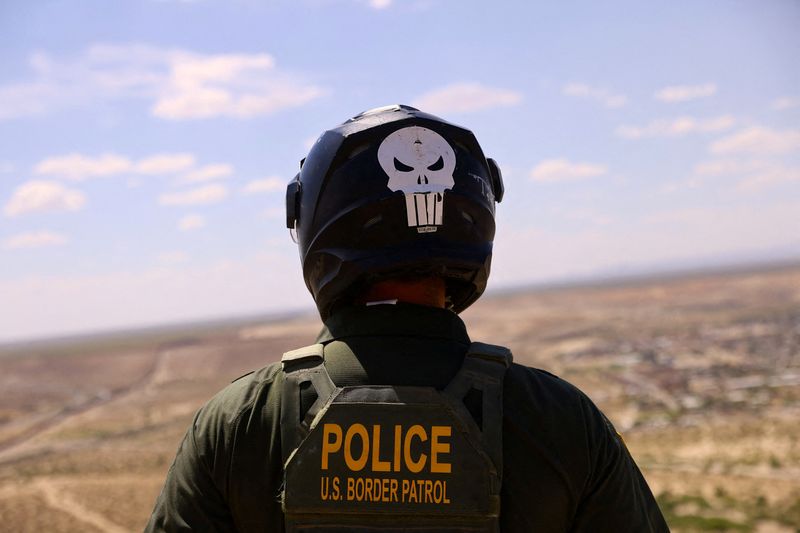By Gram Slattery
WASHINGTON (Reuters) - Republican presidential hopefuls are using the Israeli-Palestinian conflict to urge tougher security at the U.S.-Mexico border, in what political operatives call a novel attempt to link a foreign conflict to the domestic debate over immigration.
The reason for that link is two-fold, say the operatives and political strategists involved in the 2024 primary campaign.
Illegal immigration ranks near the top of Republican voters' concerns, meaning candidates are intent on bringing up the topic on the campaign trail as much as possible, they said.
At the same time, Republican voters are warier of foreign conflicts and less interested in foreign policy than they have been during previous competitive primary elections, said Doug Heye, a Republican strategist.
While Republicans have long portrayed themselves as steadfast defenders of Israel, it is unlikely to be an election-defining issue, he said. That makes candidates more likely to reframe the conflict in domestic terms.
Republicans have often said that militants who support or carry out attacks on Israel will try to slip through the U.S.-Mexico border, despite scant evidence of it. There are no known incidents of Americans being injured in militant attacks by immigrants who entered America illegally, according to a study published by the libertarian Cato Institute, which examined the period between 1975 and 2022.
"It's some pretty creative campaigning to link a foreign conflict to border security, which (the candidates) know Republicans really care about,' said Whit Ayres, a Republican pollster with over 30 years of campaign experience. "We'll see if it's effective or not, but it's certainly innovative."
Former U.N. Ambassador Nikki Haley, who is third in most polls behind former President Donald Trump and Florida Governor Ron DeSantis, is among several Republican candidates who have used the conflict to push for tightened border controls.
On NBC's "Meet the Press" on Oct. 8, she said the surprise attack by militants from the Palestinian group Hamas on Israel on Oct. 7 should serve as a wake-up call for the United States to seal off its southern border from potential terrorists.
"(Immigrants) are not being vetted. We don't need to wait for another 9/11," she said.
Trump said at a rally in Iowa on Monday he would direct law enforcement to deport immigrants who publicly support Hamas. He also said, without evidence, that Hamas militants were pouring over the U.S.-Mexico border.
In a a social media post this month that included images of an explosion in Gaza, the Palestinian territory at the center of the conflict, DeSantis wrote that America was "vulnerable with so many military-age men coming into our country" via the U.S.-Mexico border.
A Reuters/Ipsos poll conducted Oct. 6-8, which included responses from both before and after the initial attack on Israel on Oct. 7, showed 4% of Republicans picked war and conflict as the most important issue facing the nation, while about one in four described immigration as their top issue, second only to the nation's economic health.
Border Patrol agents do encounter individuals on the Terrorist Screening Dataset, or TSDS list, a system that tracks known or suspected terrorists, as well as family members and affiliates.
A September report from the Department of Homeland Security Inspector General noted that border agents encountered about 160 non-citizens on the TSDS list in the fiscal year through July, an increase from about 100 in fiscal 2022.
That still comes to less than 0.0001% of immigrants encountered at the southern border, according to U.S. Customs and Border Protection data, and there is no record of Hamas affiliates being detained in recent years.
Even those numbers may exaggerate the issue, as they include affiliates of the FARC, a guerrilla group in Colombia, DHS said. The U.S. revoked FARC's terrorist designation in 2021, five years after it made peace with the Colombian government, and the vast majority of its members have laid down arms.
STRATEGY BRINGS RISKS
Republicans have drawn a link between national security and border security before, albeit in broader terms.
When he ran for president in 2015, Trump pledged a "total and complete shutdown" of Muslims entering the United States following a deadly attack by ISIS sympathizers in California. When he was president, Trump did ultimately ban travel from seven Muslim-majority countries.
But proposals to beef up border security in response to a foreign conflict with no obvious nexus to the U.S.-Mexico frontier appear novel, strategists said.
"It's given Republican candidates an opening to play to base voters on illegal immigration," said Rob Godfrey, a political consultant and former senior Haley aide.
Still, the immigration crackdown that Republican candidates have proposed is not without risk, said Ayres, the Republican pollster.
He said some of the proposals that Republicans have rolled out risk turning off middle-of-the-road voters that a Republican nominee will need to win over in the November 2024 election.

During his Monday speech in Iowa, Trump vowed to step up travel bans from "terror plagued" countries, without explaining how he would enforce his proposals.
"You've got to be credible (on immigration) and you've got to be persuasive," Ayres said. "It's possible to do all of that, but blanket bans for people is a total non-starter."